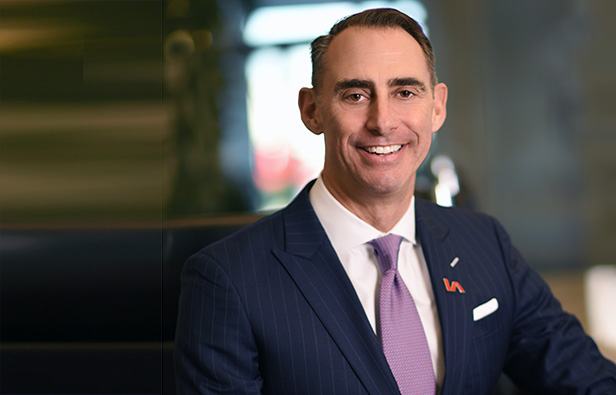 Even if the COVID all-clear sounds shortly, we'll be facing a presidential election, "always a time of market uncertainty," says Rinkov. "But I think that will be diminished simply by demand and the regeneration of interest in commercial real estate."
Even if the COVID all-clear sounds shortly, we'll be facing a presidential election, "always a time of market uncertainty," says Rinkov. "But I think that will be diminished simply by demand and the regeneration of interest in commercial real estate."
LOS ANGELES, CA – The COVID-19-induced economic slowdown isn't hampering the pace of Lee & Associates, which rolled out a triumvirate of office expansions stretching down the eastern seaboard. In the last few weeks, the firm has expanded into Boston, Massachusetts; Washington, D.C. and Naples, Florida.
"These are all markets where we've been sending business, but we haven't been able to service business ourselves," says Lee CEO Jeff Rinkov. That's about to change.
In Boston, Lee has taken over the former Landmark Real Estate Advisors. "The growth potential there is tremendous," says Rinkov . "They're currently office, retail and industrial tenant representation only, so our plan is to add agency representation teams as well as a breadth of product disciplines." Multifamily, suburban tech and life sciences are among those targeted products types.
What was a three-person shop has already grown to six, and Rinkov projects further growth to at least 20 in the next two to three years. The newly branded Lee & Associates Boston office opened on April 30, 2020. The new office will be led by Eric Solem, Ty Janney and Robert Elmer, J.D.
In Washington, D.C., the firm absorbed a former competitive team to beef up investment and land sales, Rinkov explains. The team has already worked with Lee's Columbia, Maryland office and so can "hit the ground running," he says. "We have tremendous opportunity in D.C. to add agency and tenant representation on the office side and to grow our investment and suburban D.C. industrial market as well."
Much the same synergies are in place in Naples as well, he says. Eight brokers are transferring from the Fort Myers office and will be working with the already established Lee Fort Myers stronghold. Similar to the other two markets to the north, the team is "multi-disciplined with an already established infrastructure. So we now have four offices in Florida."
The expansions are a continuation of the firm's focus over the past few years, in which Lee planted flags in Toronto and Vancouver, Canada; Walnut Creek and Pasadena, California; Seattle, Washington; Houston, Texas; Minneapolis, Minnesota; Cincinnati and Columbus, Ohio; Raleigh, North Carolina, Miami, Florida; and Lehigh Valley, Pennsylvania.
Interestingly, all of the expansions were fueled without debt. "Our entire structure is completely debt free," says Rinkov. "That capital is raised from our group of principals in North America and deployed to local offices that participate in our capital structure. It's earmarked for expansion and all of the participating partners enjoy the benefit of a dividend from their growing revenue ."
Still, it's an interesting time for expansions, given the general impact on economic growth that has come as a result of COVID-19. Rinkov says each of the new markets remains robust and that the only impact was a slowing of expansion plans while corporate focused on the needs of all the currently operating offices.
"We're still transacting," he says, " although volume has diminished." He explains further, "In Boston, D.C. and Naples, we still have pretty robust pipelines."
Rinkov remains optimistic about the return to economic strength after the COVID all-clear is sounded, whatever shape that takes. Not even the looming presidential election, always a powerful damper on investment expectations, will slow the pent-up demand.
"Presidential elections are always a time of market uncertainty," he says. "But I think that will be diminished simply by demand and the regeneration of interest in commercial real estate."
In fact, when the current crisis is over, he expects the previous record-breaking upcycle to continue and the massive unemployment rate to start correcting itself. "By Q4, we'll start to see the results of this pent-up demand, the accumulation of additional capital- seeking opportunities and, if I had to guess, a return to where we were maybe in February. You'll see continued migration back into tangible assets that will support the market and a return of institutional and local investments back into real estate."
© 2025 ALM Global, LLC, All Rights Reserved. Request academic re-use from www.copyright.com. All other uses, submit a request to [email protected]. For more information visit Asset & Logo Licensing.








